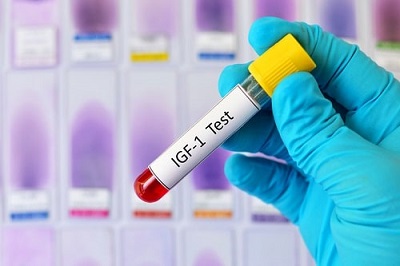
What Is IGF-1?
Insulin growth factor 1, also called IGF-1, is a chemical produced by your liver. Your body needs IGF-1 to assist growth hormone with cellular regeneration. What is IGF-1, how does your body produce it, and why is it important? These are the questions we will answer in this report.
Because of its anabolic muscle-building and bone-strengthening abilities, we often hear the question is IGF-1 a steroid. The answer is no, IGF-1 is a peptide hormone that also goes by the name somatomedin C. IGF-1 is a protein that has a similar molecular structure to insulin, although an entirely different set of functions. It is a single chain hormone consisting of 70 amino acids.
IGF-1 is one of the most misunderstood hormones in the human body. Some studies suggest that elevated levels of IGF-1 increase the risk of breast, prostate, colorectal, and other cancers and heart disease. Other studies report that low levels of IGF-1 increase the risk of heart disease and cancer.
What we do know is that insulin growth factor 1 does have protective benefits for the adult body. The key is to keep its levels in the normal range – not too high and not too low.
IGF-1 is a peptide hormone that mediates many of the effects of growth hormone in the body – especially cellular regeneration.
How Does the Body Produce IGF-1?
We normally think of endocrine hormones being produced in the body’s glands. In this case, however, IGF-1 is an endocrine hormone manufactured by an organ – the liver. A small portion of IGF-1 production occurs in target tissues throughout the body in a paracrine/autocrine fashion.
What is IGF-1 hormone production like and how does it occur?
The primary stimulus for the production of IGF-1 occurs when the pituitary gland secretes human growth hormone into the bloodstream. Although the body and brain are full of HGH receptor cells, it is the ones in the liver that use HGH to initiate IGF-1 production. Once the liver receives a supply of growth hormone, it secretes IGF-1 into the bloodstream. Insulin growth factor 1 is almost always (98 percent of the time) bound to a protein. There are six binding proteins (IGF-BP) available, with IGFBP-3 accounting for about 80 percent of the IGF-1 binding in the body.
What is IGF-1 production stimulated by?
The intake of protein significantly influences IGF-1 secretion. Conversely, a diet high in refined carbohydrates and sugar can lead to a spike in insulin levels which can lower IGF-1 and growth hormone levels. Because IGF-1 requires growth hormone, the same things that interfere with HGH production can lower IGF-1 levels.
Factors included in the lowering of HGH and IGF-1 production are:
- Too much stress – when the body feels stressed, it increases production of the hormone cortisol. High levels of cortisol make it difficult to relax and fall asleep at night. Cortisol also inhibits the production of growth hormone as well as testosterone. Since HGH and testosterone influence each other’s secretion, a shortage of one hormone often means a deficiency of both, as well as IGF-1.
- Not enough sleep – more than half the daily production of HGH occurs while you sleep. This is also a time when the body manufactures testosterone and IGF-1. Getting less than the recommended 7 to 8 hours of sleep per night can significantly lower your hormone levels.
- Lack of exercise – during the day, exercise can boost your HGH and subsequent IGF-1 secretion. Engaging in resistance training that targets the large muscle groups as well as high-intensity interval training can make a significant difference in hormone production.
- Nutrition and weight – adults who are overweight are more at risk of having lower hormone levels. Weight loss, intermittent fasting, avoiding sugar and refined carbohydrates, and consuming lean protein, fruits and vegetables can help improve hormone levels.
IGF-1 production follows the delivery of human growth hormone to the liver, which then stimulates its secretion.
What Does IGF-1 Do for the Body?
IGF-1 is the mediator of growth hormone’s effects in the body. What is IGF-1 good for when you increase HGH levels? IGF-1 helps HGH replicate and regenerate the body’s many cells. The process of cellular reproduction supplies the muscles, bones, skin, hair, nails, cartilage, and internal organs with the cells needed to replace those that die away. When HGH and IGF-1 levels are low, cell regeneration slows down. With old cells dying off faster than the body can replicate new cells, problems arise. Muscles and internal organs begin to shrink, bones become weak and brittle, and the skin and hair show the signs of aging. Even the blood needs a plentiful supply of new cells or anemia can occur.
IGF-1 also helps the body heal. Think about what happens when you get a cut or break a bone. Your body needs new cells to initiate the healing process. The same goes for damaged gut lining, especially for people with inflammatory bowel disease. IGF-1 and HGH provide the healing cells the body requires.
Just as there are HGH receptors in the brain, there are also IGF-1 receptor cells that require an ample supply of insulin growth factor 1 each day. IGF-1 aids in brain functions and is also beneficial in lowering inflammation in the body.
IGF-1 is essential for supplying the body with new cells, as well as reducing inflammation and aiding brain functions.
How Do You Increase IGF-1?
Because of its mediating effects for growth hormone, it is vital to ensure that IGF-1 levels remain in the normal range. The best way to increase IGF-1 is to boost growth hormone levels in the bloodstream. IGF-1 levels testing can determine if an adult has a growth hormone deficiency. If so, treatment with HGH injections will also improve IGF-1 levels.
What is IGF-1 levels testing?
IGF-1 levels testing consists of a blood test that measures how much insulin growth factor 1 is in the bloodstream. To check for growth hormone deficiency, a doctor will request a sample of blood to be collected early in the morning, while the individual is in a fasting state. That provides the most accurate assessment of HGH and IGF-1 levels.
To find out what is the IGF-1 test result going to mean for you, please contact our hormone clinic for a free consultation.
The primary way to increase low IGF-1 levels is with HGH therapy to increase human growth hormone levels.

